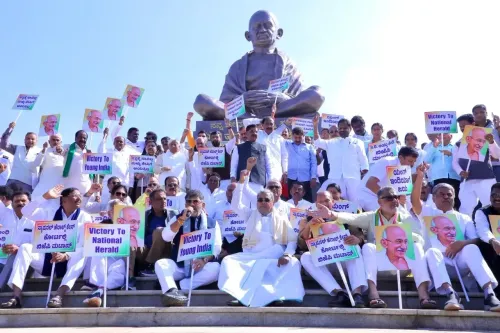Did the CBI File a Charge Sheet in the Rajasthan Digital Arrest Case?

Synopsis
Key Takeaways
- The CBI filed a charge sheet against four accused in a digital arrest cyber fraud case.
- The victim was extorted for ₹7.67 crore over three months.
- Operation Chakra-V targets organized cyber crime syndicates.
- The agency is committed to dismantling cybercrime infrastructure.
- Cybercriminals use psychological tactics to extort money from victims.
Jaipur, June 10 (NationPress) The Central Bureau of Investigation (CBI) has submitted a charge sheet to a court in Rajasthan’s Jhunjhunu against four individuals involved in a cyber fraud case related to digital arrests.
The case was initially registered at the Cyber Police Station in Jhunjhunu.
Following a request from the Rajasthan government, the CBI assumed control of the cybercrime investigation.
A victim, a professor at a prestigious educational institution, was held digitally for over three months by cybercriminals who impersonated law enforcement officials, resulting in 42 extortion incidents that totaled ₹7.67 crore.
Upon concluding its investigation, the agency filed its charge sheet before the Chief Judicial Magistrate in Jhunjhunu against four suspects implicated in the cyber crimes. The CBI developed vital leads and conducted thorough searches at various locations nationwide during the investigation.
According to the agency's statement, "These searches resulted in the recovery of significant incriminating evidence against the accused individuals. To date, a total of eight individuals have been arrested in connection to this case."
All eight suspects are currently in judicial custody, and as mandated by law, the charge sheet has been filed against the four accused within the legal timeframe of 60 days from their arrest, the statement added.
Investigations continue into the remaining four suspects.
In April of this year, the CBI apprehended four ‘kingpins’, two from Mumbai and two from Moradabad, Uttar Pradesh, who were involved in this organized crime syndicate as part of its Operation Chakra-V initiative aimed at dismantling the infrastructure supporting such cyber crimes. The agency has been proactive in combating cybercrimes like digital arrests, employing a comprehensive strategy to investigate these cases and dismantle the entire framework.
Recently, digital arrest scams have surged in the nation, with scammers making video calls to potential victims. Their typical method is to impersonate officials from law enforcement or regulatory agencies, confronting the victim about an offense they did not commit. The cyber syndicate applies psychological pressure on victims, claiming they have been ‘digitally arrested’ for some crime, then proceeds to extort money before ‘releasing’ them from digital custody.










